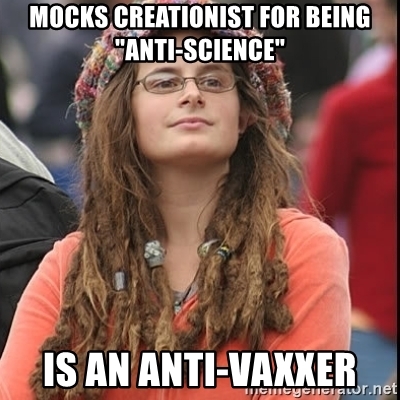Public Health Concerns: Anti-Vaxxer Leading Autism Study

Table of Contents
The Debunked Wakefield Study and its Lingering Impact
The infamous 1998 Lancet paper by Andrew Wakefield, suggesting a link between the MMR (measles, mumps, and rubella) vaccine and autism, stands as a prime example of the devastating consequences of fraudulent research. Wakefield's study, characterized by flawed methodology, a tiny sample size, and a complete lack of controls, was ultimately retracted by the Lancet and led to the withdrawal of his medical license. His actions were found to be fraudulent, driven by financial conflicts of interest. Despite its complete discrediting, this study continues to be cited by anti-vaxxer groups as "evidence" supporting their claims.
- Flawed Methodology: The study's small sample size and lack of a control group rendered its conclusions statistically meaningless and unreliable.
- Conflict of Interest: Wakefield had financial ties to lawyers suing vaccine manufacturers, creating a clear conflict of interest that compromised the integrity of his research.
- Retraction and Disciplinary Action: The Lancet officially retracted the paper, and Wakefield's medical license was revoked, highlighting the severity of his misconduct.
- Lingering Impact: Despite its retraction, the Wakefield study continues to fuel vaccine hesitancy and mistrust in the medical community, resulting in preventable disease outbreaks.
The Spread of Misinformation Through Social Media and Online Communities
Anti-vaxxer groups effectively utilize social media platforms like Facebook, Twitter, and Instagram, and online forums to disseminate false information about vaccines and autism. They employ various tactics, including emotional appeals, conspiracy theories, and the manipulation of data, to create a narrative that links vaccines to autism, despite the overwhelming scientific consensus to the contrary. Echo chambers and confirmation bias reinforce these anti-vaccine beliefs, making it challenging to counter the spread of misinformation.
- Misleading Social Media Posts: Anti-vaxxers often share misleading images, graphs, and testimonials, selectively presenting information that supports their claims while ignoring contradictory evidence.
- Manipulated Data and Fabricated Statistics: False statistics and manipulated images are frequently used to create a sense of urgency and fear, driving engagement and furthering the spread of misinformation.
- Echo Chambers and Confirmation Bias: Online communities reinforce anti-vaccine beliefs, creating echo chambers where dissenting opinions are suppressed and misinformation is amplified.
- Algorithmic Amplification: Social media algorithms often amplify sensationalized content, inadvertently boosting the reach of anti-vaccine messages and hindering the spread of accurate information.
The Impact of Vaccine Hesitancy on Public Health
Vaccine hesitancy significantly undermines herd immunity, a crucial concept in public health. Herd immunity protects vulnerable populations, including infants and immunocompromised individuals, by preventing the spread of infectious diseases. When vaccination rates decline, the risk of outbreaks of preventable diseases like measles, mumps, and rubella dramatically increases. The public health consequences include increased healthcare costs, hospitalizations, and even death.
- Resurgence of Vaccine-Preventable Diseases: Declining vaccination rates have led to the resurgence of several vaccine-preventable diseases in many parts of the world.
- Increased Healthcare Costs: Treating vaccine-preventable illnesses places a significant burden on healthcare systems, leading to higher costs for individuals, insurers, and governments.
- Long-Term Health Complications: Many vaccine-preventable diseases can lead to severe long-term health complications, impacting quality of life and increasing healthcare burdens.
- Impact on Vulnerable Populations: The most vulnerable members of society, such as infants and those with weakened immune systems, are at the greatest risk when herd immunity is compromised.
The Importance of Evidence-Based Autism Research
It is crucial to focus on scientifically sound research into the causes and treatments of autism, separating valid scientific inquiry from anti-vaccine propaganda. Ethical considerations are paramount; research should never inadvertently contribute to vaccine hesitancy or promote misinformation. Funding and support should be directed towards reputable organizations and researchers using rigorous methodologies to uncover the true causes of autism and develop effective treatments.
- Reputable Organizations: Organizations like the CDC and WHO provide reliable information on vaccines and autism, and many universities conduct rigorous autism research.
- Peer-Reviewed Publications: Prioritizing peer-reviewed publications ensures the quality and validity of research findings and helps to filter out misleading or unreliable information.
- Ethical Review Boards: Ethical review boards play a crucial role in ensuring that research is conducted ethically and responsibly, protecting the rights and well-being of participants.
Conclusion
The persistent promotion of false information by anti-vaxxer groups, especially regarding the link between vaccines and autism, poses a grave threat to public health. The debunked Wakefield study continues to have a damaging impact, fueled by the spread of misinformation through social media and online communities. This undermines vaccine uptake, jeopardizes herd immunity, and leads to preventable outbreaks of serious diseases. We must prioritize evidence-based research on autism and actively combat the spread of dangerous anti-vaccine propaganda.
Call to Action: Protect your family and community. Learn the facts about vaccines and autism from reputable sources like the CDC and WHO. Don't let anti-vaxxer misinformation influence your decisions regarding vaccination. Support evidence-based research and advocate for public health initiatives that promote vaccination and debunk harmful myths about the link between vaccines and autism. Let's work together to ensure the health and well-being of our communities by promoting accurate information and supporting vaccination efforts.

Featured Posts
-
 Broadcoms V Mware Deal An Extreme Price Hike Concerns At And T
Apr 27, 2025
Broadcoms V Mware Deal An Extreme Price Hike Concerns At And T
Apr 27, 2025 -
 Paolini Y Pegula Sorpresa En Dubai Eliminadas De Wta 1000
Apr 27, 2025
Paolini Y Pegula Sorpresa En Dubai Eliminadas De Wta 1000
Apr 27, 2025 -
 Brazil Bound Justin Herbert And The Chargers 2025 Season Opener
Apr 27, 2025
Brazil Bound Justin Herbert And The Chargers 2025 Season Opener
Apr 27, 2025 -
 Plan Your Happy Day February 20 2025
Apr 27, 2025
Plan Your Happy Day February 20 2025
Apr 27, 2025 -
 Trade Deals On The Horizon Trumps 3 4 Week Prediction
Apr 27, 2025
Trade Deals On The Horizon Trumps 3 4 Week Prediction
Apr 27, 2025
